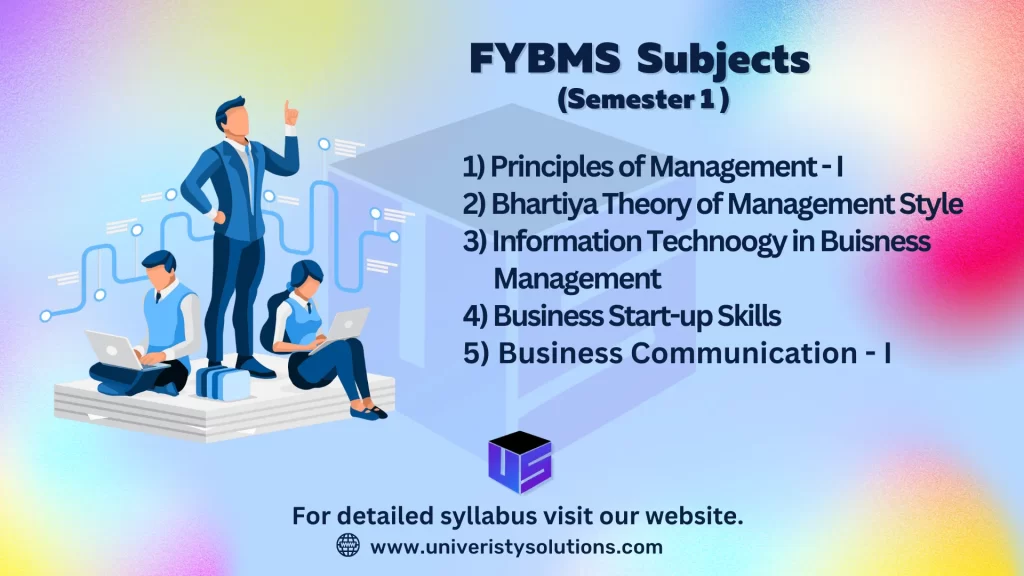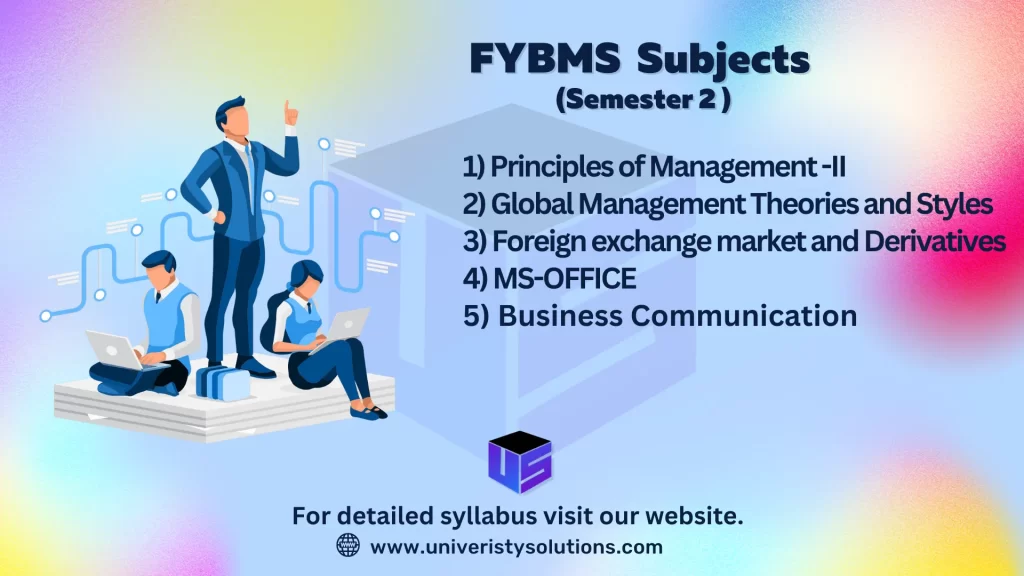
FYBMS Subjects
(Semester 1)
(FYBMS means First Year Bachelor of Management and Studies)
Following are the list of FYBMS Subjects (Semester I):
1) Principles of Management – I
2) Bhartiya Theory of Management Style
3) Information Technology in Business Management
4) Business Start-up Skills
5) Business Communication – I
FYBMS Subjects
Semester 1 (Chapters)
FYBMS SEM 1 Principles of Management – I Chapters
Chapter 1 – Introduction to Management & Managerial Thoughts
Chapter 2 – Management Thoughts
Chapter 3 – Functions of Management -I
Chapter 4 – Functions of Management -II
FYBMS SEM 1 Bhartiya Theory of Management Styles Chapters
Chapter 1 – Introduction of Bhartiya theory of Management styles
Chapter 2 – Six Universal Management Styles of Bhartiya Theory
FYBMS SEM 1 Information Technology in Business Management Chapters
Chapter 1 – Introduction to IT Support in Management
Chapter 2 – Emergence of E- commerce and M-Commerce
FYBMS SEM 1 Business Start-up Skills Chapters
Chapter 1 – Introduction to Business Start-ups
Chapter 2 – Initiatives to encourage Business Start-ups
FYBMS SEM 1 Business Communication- I Chapters
Chapter 1 – Theory of Communication
Chapter 2 – Obstacles to Communication in Business World
Chapter 3 – Business Correspondence
Chapter 4 – Language and Writing Skills
Related Posts :
FYBMS Subjects
SYBMS Subjects
TYBMS Subjects
FYBMS Syllabus
SYBMS Syllabus
TYBMS Syllabus
FYBMS Subjects
(Semester 2)

Following are the list of FYBMS Subjects (Semester II):
1) Principles of Management -II
2) Global Management Theories and Styles
3) Foreign exchange market and Derivatives
4) MS-OFFICE
5) Business Communication – II
FYBMS Subjects
Semester 2 (Chapters)
FYBMS Sem 2 Principles of Management – II Chapters
Chapter 1 – Functions of Management – III
Chapter 2 – Unit Functions of Management -IV
Chapter 3 – Managerial Opportunities & Challenges – I
Chapter 4 – Managerial Opportunities & Challenges – II
FYBMS Sem 2 Global Management Theories and Styles Chapters
Chapter 1 – Introduction to Organizational Development and Global Motivation Theories
Chapter 2 – Global Leadership Theories and Management Styles
FYBMS Sem 2 Foreign exchange market and Derivatives Chapters
Chapter 1 – Foreign Exchange Markets – an Overview
Chapter 2 – Derivatives Market
FYBMS Sem 2 MS-OFFICE Chapters
Chapter 1 – MS Word and MS Power Point
Chapter 2 – MS Excel – Basic and Advanced
FYBMS Sem 2 Business Communication – II Chapters
Chapter 1 – Presentation Skills
Chapter 2 – Group Communication
Chapter 3 – Business Correspondence
Chapter 4 – Language and Writing Skills
FYBMS New Subjects 2024 – Free PDF
Tips to score good marks in FYBMS Exam
- Don’t wait until the last minute to start studying: begin early. You’ll have more time to learn the topic and solve questions, the earlier you start.
- Remain arranged: Plan a study schedule and stick to it. Take time to rest and refresh during breaks.
- Regularly review your notes: Regularly reviewing back your notes will help you keep the content in your memory.
- Practice, practice, practice: By working through sample problems and completing sample tests, you can identify your areas of weakness and become familiar with the exam’s format.
- Ask for assistance if you need it: If you’re having trouble with the subject, don’t be shy to ask for assistance. You can seek advice from your teacher, a classmate, or a tutor.
- Get a good night’s sleep: The night before the exam, be sure to get lots of rest. A mind that has got enough sleep is better prepared to memorize and recall information.
- Arrive early on exam day: Arrive early on the day of the exam to give yourself time to settle your worries and mentally prepare.
- Stay focused during the exam: Avoid being distracted during the exam by remaining focused. Take a deep breath and return your attention to the activity at hand if you realize that your mind is roaming.
- Don’t waste too much time on any one question: keep an eye on the time. If you start to struggle, leave it and return to it later.
- Review your exam after you’re done: After you’re finished, review your paper for a while. By doing this, you’ll be able to correct any mistakes you may have made and provide any answers you’re not sure about.
Pingback: FYBMS Syllabus - Mumbai University | Semester 1 & 2 - University Solutions
Pingback: SYBMS Subjects | Mumbai University - Semester 3 & 4 - University Solutions
Pingback: TYBMS Subjects | Semester 5 & 6 | Mumbai University - University Solutions
Pingback: TYBMS Sem 6 Innovative Financial Services Paper Pattern - Mumbai University - University Solutions
Pingback: SYBMS Finance Subjects | Syllabus of Semester 3 & 4 - Mumbai University - University Solutions
Pingback: SYBMS Syllabus - Semester 3 & 4 - Mumbai University - University Solutions
Pingback: SYBMS Marketing Subjects - Syllabus of Semester 3 & 4 - Mumbai University - University Solutions
Pingback: SYBMS HR Subjects | Semester 3 & 4 - Mumbai University - University Solutions
Pingback: TYBMS Syllabus - Semester 5 & 6 - Free Pdf -Mumbai University - University Solutions